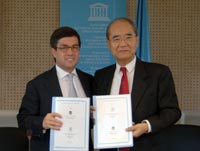UNESCO and Inter-American Development Bank

- ©UNESCO/D. Bijeljac
The Director-General of UNESCO, Koďchiro Matsuura, and the President of the Inter-American Development Bank (IDB), Luis Alberto Moreno, signed today in Paris a Memorandum of Understanding for a Strategic Partnership to expand existing cooperation between the two organizations.
This memorandum brings up to date the cooperation agreement concluded by UNESCO and the IDB in 1967. Reflecting the strategic interests of the two organizations and their new priorities, it provides a framework for cooperation between the two partners in education, science, culture and communication.
Mr Matsuura welcomed the agreement, which will "reinforce the cooperation between UNESCO and the IDB and make their joint activities all the more effective." As for Mr Moreno, he stressed "the IDB’s wish to promote quality education and better access to educational services. Together, we will make faster progress towards the Millennium Goals in these domains."
According to the agreement UNESCO and the IDB will be able to undertake joint activities in Latin America and the Caribbean in the following areas: capacity building for the achievement of Education for All (EFA) goals; the use of information technologies (ICTs) in education; ethics of science and technology; strengthening of national science and technology capacities; youth violence prevention; protection and promotion of biological and cultural diversity, including the promotion of multilingualism; prevention of natural disasters; protection and safeguarding of natural and cultural heritage, including intangible cultural heritage; development of cultural industries; and urban development.
- Author(s):Press Release N°2008-91
- Source:UNESCOPRESS
- 06-10-2008


